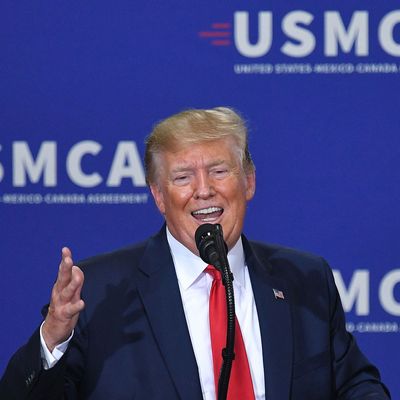
The U.S. government’s default template for a “free-trade agreement” has long resembled a grab bag of controversial giveaways to our nation’s most powerful corporate lobbies. And it isn’t hard to see why: Trade deals are long, complicated legal documents, the details of which are negotiated at a remove from democratic politics, and then (typically) presented to Congress as a referendum on the abstract concept of “free trade” and/or the sitting president. Which makes them nifty vessels for shelling out tribute to one’s favorite corporate benefactors with minimal scrutiny or debate.
During the fight over the Trans-Pacific Partnership (TPP), Barack Obama never gave a speech outlining a detailed case for why America should force poorer countries to award longer patent monopolies to pharmaceutical companies, thereby raising drug prices overseas and making them more difficult to bring down here at home. Nor, for that matter, did the Obama administration offer any real argument for extending the reach of “investor-state dispute settlement” (ISDS) — an arbitration process that allows businesses to challenge any government regulation that reduces their “expected profits” before a tribunal of corporate lawyers whose rulings cannot be appealed (if a corporation wins such a dispute, the offending government is forced to either rewrite its regulations or pay fines to compensate the company for its lost profits). Instead, the Obama White House quietly stitched those provisions into the TPP, then loudly championed the broad agreement as a vital check on China’s power.
But in 2016, this trusty gambit finally failed. Progressive Democrats raised hell over the TPP’s provisions on pharmaceuticals and ISDS. And their complaints, combined with the GOP’s reflexive opposition to all things Obama, and unions’ dissatisfaction with the agreement’s labor provisions put the TPP on death’s door. The Obama administration refused to let the deal die without a prolonged fight, even as its efforts to keep the TPP alive became a burden to Hillary Clinton’s campaign. And yet, for all its desperate efforts to secure ratification, the Obama White House never offered to scrap its handouts to pharma or extension of ISDS.
To secure its signature trade deal, the Trump administration is (reportedly) slightly more willing to cater to progressives’ concerns.
In one of the (vanishingly few) pleasant surprises of Donald Trump’s presidency, his renegotiated version of NAFTA — the uncreatively named United States–Mexico–Canada Agreement (USMCA) — significantly rolled back ISDS on the North American continent. But his administration’s initial draft retained TPP-esque handouts to Big Pharma (among many other powerful lobbies).
In the U.S. today, drug companies that produce new “biologics” — specialty drugs made with living cells — are provided 12 years of immunity from generic competition. In Mexico, biologic makers are only immunized against competition from so-called “biosimilars” for five years; in Canada, such protections last eight. As currently written, Trump’s NAFTA 2.0 would enshrine a ten-year minimum exclusivity period for biologics across North America. Such a provision would not only increase drug prices for some Mexican and Canadian consumers, but also hamstring efforts to curb Big Pharma’s privileges here at home. Congressional Democrats have drafted legislation that would cut the duration of biologic monopolies in the U.S. down to seven years. If the USMCA is ratified as written, that legislation will become nonviable; and thus, our “nationalist” president — who has called bringing down drug prices a “major priority” — will have restricted U.S. sovereignty in the name of protecting Big Pharma’s pricing power.
Happily, Nancy Pelosi’s caucus has said that the administration will need to eliminate (or at least scale back) its exclusivity protections for biologics, if it wants to see the USMCA pass the House. And to get his trade agreement across the finish line, Trump is reportedly willing to throw Big Pharma under the bus. As the Financial Times reports:
The Trump administration is prepared to scrap provisions in the new USMCA trade pact that would benefit US pharmaceutical and biotech companies selling medicine in Canada and Mexico, according to people briefed on the negotiations. In a move expected to win support for the deal from Democrats in Congress, the US Trade Representative has signaled it is willing to make concessions on a provision that would allow developers of cutting-edge biologic drugs to benefit from 10 years of data protection before they were forced to contend with generic competition, the people said.
Meanwhile, Pelosi is pressing to strike other attempts to export and entrench the controversial legal privileges of American corporations:
House Speaker Nancy Pelosi is pushing to strip out sweeping legal protections for online content in the new trade pact with Mexico and Canada, in what would be a blow for big technology companies.
Internet firms lobbied hard to include the immunity language in the trade agreement, seeing it as a way to extend to Mexico and Canada the broad umbrella of legal protection they enjoy in the U.S.
But the trade-pact language also could make it harder for Congress to withdraw the current federal online protections for internet firms in the future, some lawmakers fear. That is causing second thoughts about including the legal shield — regarded by tech firms as a pillar of the internet — in a trade pact.
On these issues, Democrats have the advantage of Mexican and Canadian support. The party’s other top priority — strengthening labor protections for Mexican workers (so as to reduce the appeal of relocation to U.S. employers) — enjoys no such benefit.
Nevertheless, if the final version of the USMCA curbs ISDS, and does little to fortify pharma’s pricing power or Facebook’s immunity from legislative challenge, it may be worth ratifying. As the Financial Times notes, “The USMCA is considered the template for US trade deals under Mr Trump” — and that template is starting to look slightly more progressive than the one he inherited.






























